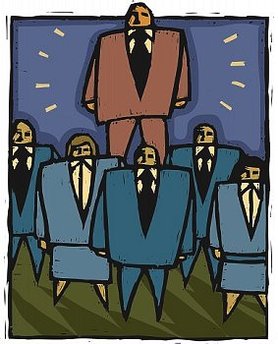
Writer’s Name: Allison Martin
Title: Five Characteristics of an Effective Leader
Great Leaders Are:
Passionate. Within any organization, whether it is a large corporation or sole-proprietorship, the “tone-at-the-top” always reigns supreme. Inputs always determine outputs so a great leader must exemplify a spirit of passion when engaging in the day-to-day tasks. The leader of an organization is chosen to steer his ship (if you will) in the right direction and avoid negativity and destruction by any means necessary. In order to do this, the leader must believe in the company and its mission and strive for excellence to ensure long-term survival. Typically, if this is the case, employees will follow suit and have a greater sense of pride. In addition, they will feel as if they belong and willingly strive to strengthen the organization. On the other hand, leaders who lack passion can quickly corrupt and destroy any organization.
Open-Minded. Change is inevitable in almost all facets of life, especially in the business world. In order to continue to thrive and keep up with the pace of the various industry markets, companies must be willing to adapt. Since change typically occurs at the top of the organization and has a trickle-down effect, the leader must be willing to rapidly adjust to the market conditions to ensure the long-term success of the company. In addition, it is essential that leaders be open to suggestions from their professional colleagues and employees that provide tactics or ways to increase various elements of the business, whether it is quality control or standard operating procedures.
High Morals and Values. In many instances, particularly small-businesses with few employees, the leader is the face of the first organization and the first individual who those engaged in company relations think of. A vast majority of business relationships are developed because the consumer trusts the salesperson they are dealing with. In addition, he or she is comfortable with the company because of their strong morals and values, which exemplify that the company has the best interest(s) of their customer(s) at heart. Any reasonable individual does not want to conduct affairs with a shady organization that can possibly “screw them over.” High morals and values are also important within any company because the lack of creates a cut-throat and less than pleasant environment where employees are out to get each other and will do just about anything to get ahead.
Great communicator. All great leaders must be able to communicate effectively with employees, professionals from other organizations within their industry, and customers. It is safe to say that once the business operations reach a certain level, most leaders aren’t involved in the day-to-day operational activities. With that being said, they must be able to communicate effectively with employees to stay abreast of what is taking place, potential concerns that need to be addressed, and suggestions for improvement. In some industries, opportunities for partnerships with other entities may arise so positive and open lines of communication are also necessary in these situations. Lastly, in the event that a customer is unhappy or wants to give their favorite worker a compliment, they almost always head for the top of the food chain, management.
Effective Delegation Skills. What good are employees if a leader has control issues and always wants to “run the show” (literally)? Since leaders are brought on board to oversee and strategically steer the company in the right direction, they should focus on the big picture and delegate the day-to-day tasks to others. It’s easy for a leader to be afraid to delegate tasks due to the fear of potential inaccuracies or slip shod. However, this can be combated by paying particular attention to the types of individuals that are being brought into the company.
 RSS Feed
RSS Feed
